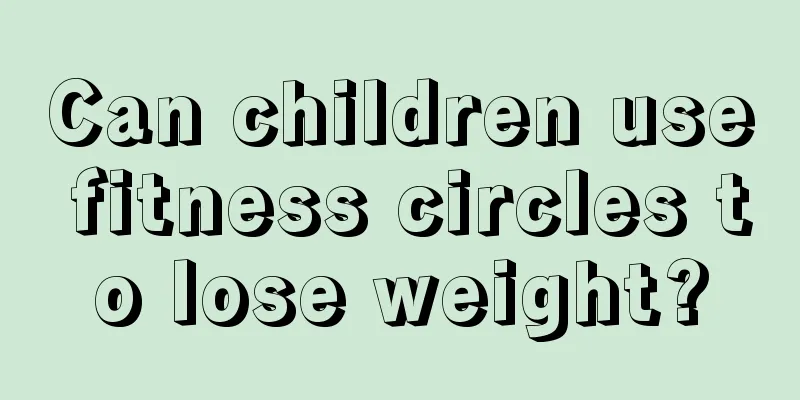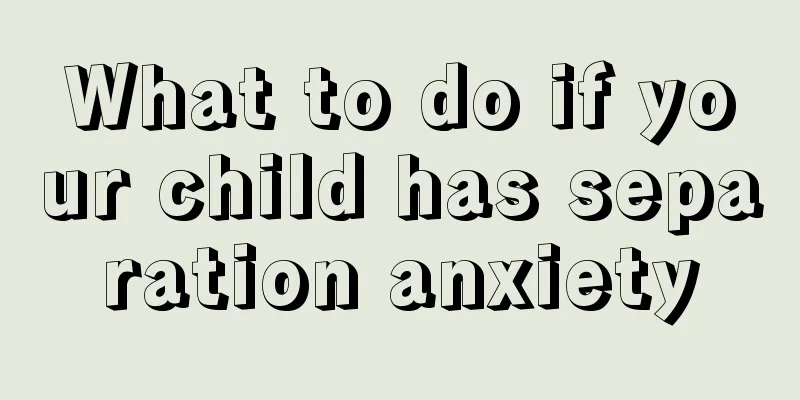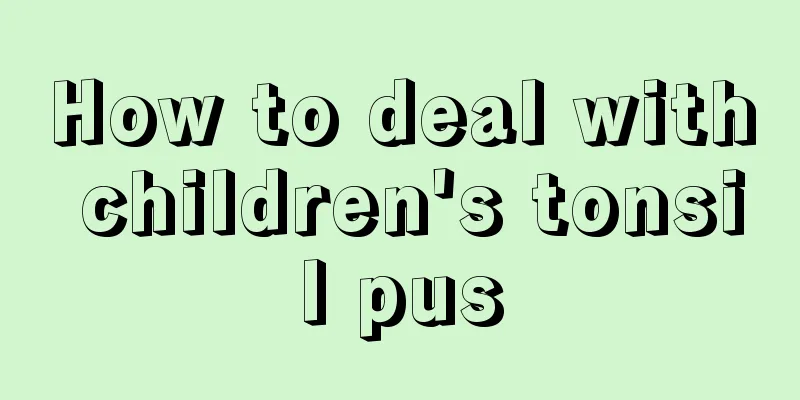What to do if your baby farts a lot

|
Although farting is a normal physiological phenomenon, frequent farting may indicate some health problems. So what’s going on when babies fart a lot? There are many factors that cause babies to fart frequently, such as poor gastrointestinal function, indigestion, or eating a lot of starchy food, swallowing bacteria, milk syndrome, etc. In short, if your baby suddenly farts a lot, you should pay special attention to it. Why do babies fart? In fact, it is normal for babies to fart. Parents can understand the gastrointestinal condition of their babies from the phenomenon of farting. There are several points to be specific: 1. The baby has indigestion. Many times, babies often fart and they are all smelly farts or they burp continuously, and they smell sour and smelly. This indicates that the baby has indigestion. Mom and Dad should reduce the amount of milk on a normal basis, feed the baby more boiled water, and reduce the intake of foods high in fat and protein; the rice porridge that is usually eaten can be made thinner and the amount of rice porridge can be reduced. Mom and Dad can appropriately add glucose containing bifidobacteria factors to the baby, because bifidobacteria factors can be converted into bifidobacteria in the baby's gastrointestinal tract, which can effectively inhibit Escherichia coli and promote food digestion and absorption. This is one reason why babies fart a lot. 2. Babies’ frequent farting is also related to hunger. Why do babies fart all the time? They fart intermittently and continuously, and they are all empty farts, but there is no bad smell. This situation is mostly caused by frequent intestinal peristalsis caused by hunger after the baby's gastrointestinal tract is emptied. At this time, you can often hear bowel sounds and gurgling sounds. This means the baby is hungry, and mom and dad should feed the baby milk or complementary food in time. 3. Eating foods high in starch content. Sometimes babies fart a lot and have a lot of feces. This is usually caused by the baby eating too much high-starch food. At this time, parents should reduce the intake of high-starch food and appropriately increase the intake of protein and fat food. This is another reason why babies often fart that is not easy to find. Parents should pay close attention to the baby's living and eating habits, find out the real reason why the baby often farts, and take appropriate measures to solve it in time. If it is indigestion, let the baby's gastrointestinal tract rest and reduce the amount of milk and complementary food; if the baby is hungry, feed the baby milk or complementary food in time; if the baby has eaten food with high starch content, you should reduce the food with high starch content and increase the fat or protein food. ... Reasons why babies fart a lot Some mothers may find that their babies sometimes fart continuously, or even all day long. So what is the reason why babies fart a lot? There are mainly the following points: 1. Swallowing excessive air: The baby's digestive system is not yet fully developed, and the stomach is small and flat. When a large amount of air passes through the intestines, the baby will feel very uncomfortable. If there is a lot of gas, the mother should let him burp more often, and let him burp to pass gas before and during each feeding. When feeding, hold the baby in a semi-sitting position in your arms, let the baby hold the nipple and areola in his mouth, and the milk flow should not be too fast or intermittent. The hole in the rubber nipple should not be too large or too small, and do not suck the artificial nipple empty. 2. Excessive milk syndrome: characterized by crying, frequent farts, and abdominal cramps when sucking milk. The reason is that when babies consume a lot of foremilk and less hindmilk containing fatty acids, their stomachs empty quickly and excess lactose is discharged into the intestines, which leads to increased intestinal fermentation and colic symptoms. The baby should only be fed on one side at a time, and then wait 1.5-2 hours before feeding on the other side. 3. Stimulating ingredients in the mother’s diet: Breastfeeding mothers should not eat large amounts of fruits, juice, coffee, yeast, certain fish, peanuts, peanut butter, and some gas-producing vegetables such as beans, cabbage, and onions. 4. The baby wants to defecate: Another possibility is that the baby wants to defecate, then farting is also a signal of the baby's defecation. There is a good saying: wind is at the head of the rain, and fart is at the head of the shit, which means that people will inevitably fart before defecation. Based on this point, the mother can help the baby in time to let the baby defecate. Reasons why babies fart smell bad The gastrointestinal development of infants is not yet complete, and intestinal motility is not coordinated, making them more prone to intestinal bloating and flatulence, and sometimes frequent crying. This phenomenon is medically known as infant colic, which usually occurs 2-3 weeks after the baby is born and usually gradually improves after the baby is 3-4 months old. Parents need to understand this developmental problem in their baby and try to keep their baby in a comfortable position to help them expel gas. Parents should also be reminded that if babies fart constantly with a sour and smelly gas, it is a sign of indigestion. Parents should reduce the amount of milk their babies eat. They can continue to eat the same complementary foods, but in smaller amounts. Do not add new types of complementary foods and reduce the amount of foods high in protein and fat. You can make the food you eat thinner and eat less gas-causing foods. Once the baby's digestion gradually returns to normal, you can slowly return to the previous amount of milk and complementary food. You can also insist on massaging your baby every day, starting from the navel and massaging in a clockwise spiral outward to promote gastrointestinal motility and aid digestion. Secondly, you can apply hot compress to the baby’s belly to prevent the baby from catching a cold. In addition, do not change milk powder frequently. Choose a milk powder that is suitable for your baby and stick to it. Frequent changes of milk powder will cause your baby's stomach to adapt. If improving the baby's diet is ineffective, parents can let the baby take some stomach-strengthening and digestion-promoting medicine, or give the baby some probiotics to promote the baby's digestion and absorption of food. Reasons why babies fart with stool When babies fart and have feces, many new mothers will panic and think that the baby is sick. In fact, if the baby's diet and mental state are good and there is no diarrhea, it is normal to fart with stool. There are mainly the following reasons: 1. The baby's farts with feces are related to the environment. If the baby catches a cold, he will fart with stool. When autumn and winter come, you must keep your baby warm, especially when sleeping, the navel must be covered to prevent the baby from catching cold. 2. The baby's farting with feces is related to diet. The baby's food all comes from the mother. If the baby is breastfed, you need to check whether there are any changes in the individual's diet recently. If your baby is not breast-fed but fed with formula, you need to check whether the brand of the baby's formula has changed. 3. When your baby farts or poops, observe the color and amount. If your baby's stool is not green or black, there is no need to take medicine or see a doctor. If your stool has a strong odor or is large in quantity, you should go to the hospital to check if there is any problem. 4. Because the baby is too young and has a weak ability to control defecation, it is easy for him to bring out feces when farting. If your baby has diarrhea, you should consider whether the baby has indigestion or intestinal bacterial infection. Take digestive medicine under the guidance of a doctor, and adjust the baby's diet to ensure a balance between complementary food and milk. What to do if your baby farts but doesn't poop Some babies fart frequently but do not defecate. It may be that the baby is holding back food, so it is normal for the baby not to defecate for a short period of time, and mothers do not need to worry too much. If the baby only farts but does not defecate for a long time, then the baby may have indigestion and can take some baby-specific medicines or probiotics appropriately. The mother can also massage the baby's belly button when she has nothing to do to help the baby speed up intestinal peristalsis and aid digestion. If the baby is breastfed, the mother should eat less spicy food. If this happens to the baby who is fed with milk, then you should consider whether to change the milk powder. If your baby does not defecate for a long time, he may be constipated. At this time, you should let your baby drink more water. The first thing the baby does when he wakes up every morning is to drink boiled water. This can not only replenish the water lost at night, but also clean the stomach and intestines and promote gastrointestinal motility. You should also feed your baby water during the day to cultivate a good habit of drinking water. If your baby really doesn't like drinking plain water, you can add some glucose to the water. The appropriate sweetness will help attract your baby. If the baby is already suffering from a fever, then timely treatment must be given and no delay is allowed. You can consult a doctor about medication, or you can choose some milder medicines for children, such as San Gongzai Children's Seven Star Tea. During the day, you can also let your baby move more appropriately, which is conducive to intestinal peristalsis and is very beneficial for the discharge of feces by the baby. |
<<: What are the symptoms of absence epilepsy in children?
>>: What is the treatment for absence epilepsy in children?
Recommend
How to solve the problem of baby kicking the quilt at night
The problem of babies kicking off the quilt at ni...
What are the methods of matching baby diet nutrition?
The diet of infants and young children is a matte...
What are the benefits of children's protein powder
It is the wish of all parents that their children...
Child's uncoordinated movements
It is understood that there are great differences...
Children who eat corn regularly can benefit their intelligence development
Years of research by many American universities a...
Why is the baby's ear discharge yellow water?
After the baby is born, if there are any abnormal...
Prevention of urinary tract infections in children
Urinary tract infection is a common urinary syste...
Acute appendicitis in children
Appendicitis is quite common. It affects people o...
What to do when your child has toothache after tooth replacement
Toothache will always occur during the period of ...
Four-year-old baby has diarrhea
Generally speaking, if a four-year-old baby has d...
Why do children have red eyes?
Many times, we don’t know why our children sudden...
Causes and treatment of duodenal obstruction in newborns
Newborns are often weak, so they often suffer fro...
What is the reason for the red pimples on the baby's back?
Once a baby has skin problems, it will always mak...
What to do if a one-year-old child has poor digestion
I believe everyone has encountered poor digestion...
Two month old baby has cold hands and feet
We all know that babies at two months old are sti...









